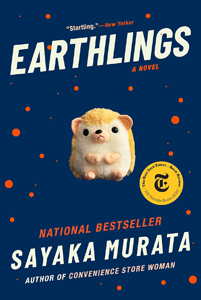“Earthlings” (2018) so effectively skews and skewers a readers’ idea of right and wrong that by the end we’re wondering whether theft, incest and murder are as bad as we’ve been led to believe. Japanese author Sayaka Murata achieves this by getting into the head of young Natsuki, who would be clinically labeled as psychotic but who narrates her adventures and actions in a matter-of-fact way.
A novel about someone who feels out of place in the human race is not rare. The usual tack is to make the character sympathetic, and to present universal situations where we say “I can relate to that.” Murata begins with a sturdy foundation of sympathy: Natsuki is an innocent preteen who straightforwardly notes that she is worthless (as per her parents’ incontrovertible judgment). But then the author gets increasingly aggressive with her outside-the-box approach, eschewing normalcy in all its forms.
“Earthlings” is sometimes categorized as magical realism because Natsuki and her playmate cousin, Yuu, earnestly believe they are aliens from the planet Popinpobopia, as per the explanation of Natsuki’s plush hedgehog (given voice by the girl herself, of course). Then we jump ahead two decades to Natsuki’s purposely non-sexual marriage to Tomoya, who retains a childlike view of the world; having been confined to the city most of his life, he glories in Natsuki’s extended family’s rundown shack in the mountains.

“Earthlings” (2018)
Author: Sayaka Murata
Genre: Character drama
Setting: Japan, modern day
Note to readers: The Book Club Book Report series features books I’m reading for my book club, Brilliant Bookworms.
However, after a while it’s clear that “Earthlings’ ” magic is only in these three people’s heads, so any escape from The Baby Factory (the real world) will not be by a literal spaceship but instead through their imaginations.
Breezy prose meets shocking events
It may seem this is a sweet, innocent story of extended adolescence. But Murata’s genius is in how she blends prose suitable for children’s storybooks with uber-adult themes of (on a blunt level) sex and violence and (on a thematic level) the struggles that come from having a different worldview than, well, the world.
Natsuki, Yuu and Tomoya are right in their observations about how society pushes people to get married and have children, and to have steady jobs and a good apartment. This is fine for the majority, who see appeal in those things or who accept this value system as a path of least resistance (as Natsuki wishes she could do). But it’s rough for people who are asexual/aromantic and have different perspectives on what matters.
But like I say, Murata isn’t interested in bombarding the reader with a series of incidents that make these three abnormal people sympathetic. Natsuki, Yuu and Tomoya challenge taboos that even free thinkers may rank as taboos.
The author starts off somewhat shockingly (although it’s mild compared to how things escalate) with the matter of attraction between cousins. Scientifically speaking, there’s little genetic risk to children born of cousins; the main reason it’s risky behavior is because society hates it. Unambiguously, marriage between cousins who don’t produce children harms no one.
Then Murata raises her game to sex between consenting children. Again, the standard reader reaction is “eww,” but a case could made it’s nothing more than a matter of two children losing their innocence earlier than would be ideal.
Doing the opposite, to the max
If you can’t handle the first two challenges to mainstream morality, you won’t be able to handle what happens later. But maybe you’ll enjoy the way Murata takes you into the head of someone whose nature is off-center and whose nurture knocks her firmly into another interpretation of reality, one where violent murder is the calling of a fairy-tale adventure. Natsuki’s actions outwardly line up with revenge or defense of her continued existence, but her brain does not directly see things that way.
The wonderful and disturbing part of “Earthlings” is that Natsuki and her two male colleagues are never off base in their criticisms of conformist society. They are in the right. And their exercises in breaking free (a twisted, grand game of “doing the opposite,” like George does in that “Seinfeld” episode) would be ingenious thought experiments if constrained to the mind.
These three people are insane from an outward perspective, yet utterly rational on a point-by-point basis. And this isn’t merely a false rationality borne of Natsuki’s skewed fantasy interpretations, such as geysers of blood being “golden liquid.” Living in the shack with their chosen lifestyle of stealing crops, walking around naked and sleeping in nests (and then doing worse things that would qualify as spoilers), they regularly self-analyze their behavior to make sure they are in alien mode, not human mode.
Murata’s novel is short and easy to read, yet deep and challenging in its insider depiction of outsiders. To side with this trio is automatically disgusting; to go against them is boringly predictable. “Earthlings” is weird, daring and uncategorizable enough to be an outsider even within the genre of outsider fiction.


